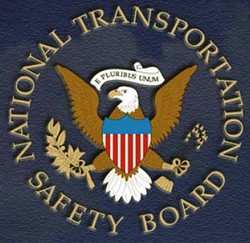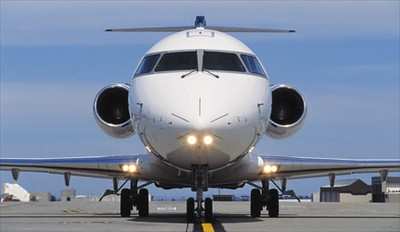Tue, Nov 21, 2006
 The National
Transportation Safety Board issued a list of safety recommendations
Monday affecting operators of Bombardier CL600-series regional jets
and corporate aircraft.
The National
Transportation Safety Board issued a list of safety recommendations
Monday affecting operators of Bombardier CL600-series regional jets
and corporate aircraft.
In its letter to the FAA, the NTSB recommends the agency require
manufacturers of airplanes equipped with General Electric CF34-1 or
CF34-3 engines to adopt a standard procedure to handle high-power,
high-altitude sudden engine shutdowns... as well as a procedure to
restart those engines after such an event.
The Board also recommends manufacturers of other turbofan
engines review their designs, to see if their powerplants are
susceptible to similar cases of "core lock" the NTSB says
contributed to the loss of a Pinnacle Airlines regional jet in
2004.
In that accident, two pilots ferrying a CRJ200 were
killed after they flew the plane on a "joyride" up to
41,000 feet, and experienced an aerodynamic stall. The disturbed
airflow caused the engines to flame out... and the pilots were
unable to get them restarted.
Below are the recommendations sent to the FAA:
- For airplanes equipped with CF34-1 or CF34-3 engines, require
manufacturers to perform high power, high altitude sudden engine
shutdowns; determine the minimum airspeed required to maintain
sufficient core rotation; and demonstrate that all methods of
in-flight restart can be accomplished when this airspeed is
maintained. (A-06-70)
- Ensure that airplane flight manuals of airplanes equipped with
CF34-1 or CF34-3 engines clearly state the minimum airspeed
required for engine core rotation and that, if this airspeed is not
maintained after a high power, high altitude sudden engine
shutdown, a loss of in-flight restart capability as a result of
core lock may occur. (A-06-71)
- Require that operators of CRJ-100, -200, and -440 airplanes
include in airplane flight manuals the significant performance
penalties, such as loss of glide distance and increased descent
rate, that can be incurred from maintaining the minimum airspeed
required for core rotation and windmill restart attempts.
(A-06-72)
- Review the design of turbine-powered engines (other than the
CF34-1 and CF34-3, which are addressed in Safety Recommendation
A-06-70) to determine whether they are susceptible to core lock
and, for those engines so identified, require manufacturers of
airplanes equipped with these engines to perform high power, high
altitude sudden engine shutdowns and determine the minimum airspeed
to maintain sufficient core rotation so that all methods of
in-flight restart can be accomplished. (A-06-73)

- For those airplanes with engines that are found to be
susceptible to core lock (other than the CF34-1 and CF34-3, which
are addressed in Safety Recommendation A-06-71), require airplane
manufacturers to incorporate information into airplane flight
manuals that clearly states the potential for core lock; the
procedures, including the minimum airspeed required, to prevent
this condition from occurring after a sudden engine shutdown; and
the resulting loss of in-flight restart capability if this
condition were to occur. (A-06-74)
- Require manufacturers to determine, as part of 14 Code of
Federal Regulations Part 25 certification tests, if restart
capability exists from a core rotation speed of 0 indicated rpm
after high power, high altitude sudden engine shutdowns. For those
airplanes determined to be susceptible to core lock, mitigate the
hazard by providing design or operational means to ensure restart
capability. (A-06-75)
- Establish certification requirements that would place upper
limits on the value of the minimum airspeed required and the amount
of altitude loss permitted for windmill restarts. (A-06-76)
More News
Aero Linx: International Federation of Airworthiness (IFA) We aim to be the most internationally respected independent authority on the subject of Airworthiness. IFA uniquely combi>[...]
Ultrahigh Frequency (UHF) The frequency band between 300 and 3,000 MHz. The bank of radio frequencies used for military air/ground voice communications. In some instances this may >[...]
A Few Questions AND Answers To Help You Get MORE Out of ANN! 1) I forgot my password. How do I find it? 1) Easy... click here and give us your e-mail address--we'll send it to you >[...]
From 2019 (YouTube Edition): Learning To Paint Without Getting Any On Your Hands PPG's Aerospace Coatings Academy is a tool designed to teach everything one needs to know about all>[...]
Also: Sustainable Aircraft Test Put Aside, More Falcon 9 Ops, Wyoming ANG Rescue, Oreo Cookie Into Orbit Joby Aviation has reason to celebrate, recently completing its first full t>[...]
 ANN's Daily Aero-Linx (05.06.25)
ANN's Daily Aero-Linx (05.06.25) ANN's Daily Aero-Term (05.06.25): Ultrahigh Frequency (UHF)
ANN's Daily Aero-Term (05.06.25): Ultrahigh Frequency (UHF) ANN FAQ: Q&A 101
ANN FAQ: Q&A 101 Classic Aero-TV: Virtual Reality Painting--PPG Leverages Technology for Training
Classic Aero-TV: Virtual Reality Painting--PPG Leverages Technology for Training Airborne 05.02.25: Joby Crewed Milestone, Diamond Club, Canadian Pilot Insurance
Airborne 05.02.25: Joby Crewed Milestone, Diamond Club, Canadian Pilot Insurance




